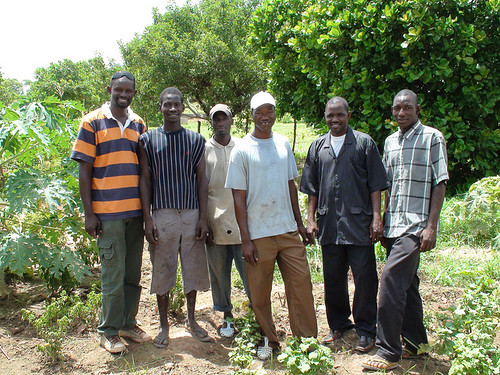Cross posted from Worldwatch Institute’s Nourishing the Planet.
This is the first part in a series about our visit with ECOVA MALI.
It’s not a new concept-farmers learning from other farmers about different agricultural techniques-but it’s one that can be difficult to execute. Foreign NGOs often offer trainings, but they don’t always fit farmers needs. But at ECOVA MALI‘s training center, 35 kilometers outside of Bamako, Mali’s capital, farmers are getting the skills they need to be better stewards of the environment, as well as better business women and men.

ECOVA was started by former Peace Corps Volunteers, Gregory Flatt and Cynthia Hellman. Along with Yacouba Kone, a Peace Corps program assistant and trainer for agriculture and natural resource management and Madou Camara, ECOVA’s Country Director, they’ve created a training center-and testing ground-for environmentally sustainable agricultural techniques. They want to encourage “home grown knowledge” by building local expertise. The facility, near the village of Terenabougou, uses local experts to teach farmers how intercropping, water conservation, agroforestry, seed saving, processing shea butter, and other practices can help both protect the environment and increase farmer income. ECOVA also instructs farmers about basic business, accounting, and marketing skills and provides small loans and “mini-grants” to allow farmers to buy tools and equipment they need and to start businesses.
ECOVA holds workshops based on requests from farmer communities-for example, they’ve worked with women’s groups from nearby communities, teaching them how to process shea butter. ECOVA hopes to eventually start training farmers about small-scale livestock production, including raising poultry and goats.
Listen to Madou Camara talk about ECOVA’s farmer to farmer training method:
Thank you for reading! As you may already know, Danielle Nierenberg is traveling across sub-Saharan Africa visiting organizations and projects that provide environmentally sustainable solutions to hunger and poverty. She has already traveled to over 19 countries and visited 130 projects highlighting stories of hope and success in the region. She will be in Gabon next, so stay tuned for more writing, photos and video from her travels.
If you enjoy reading this diary, we blog daily on Nourishing the Planet, where you can also sign up for our newsletter to receive weekly blog and travel updates. Please don’t hesitate to comment on our posts, we check them daily and look forward to an ongoing discussion with you. You can also follow us on Twitter and Facebook.